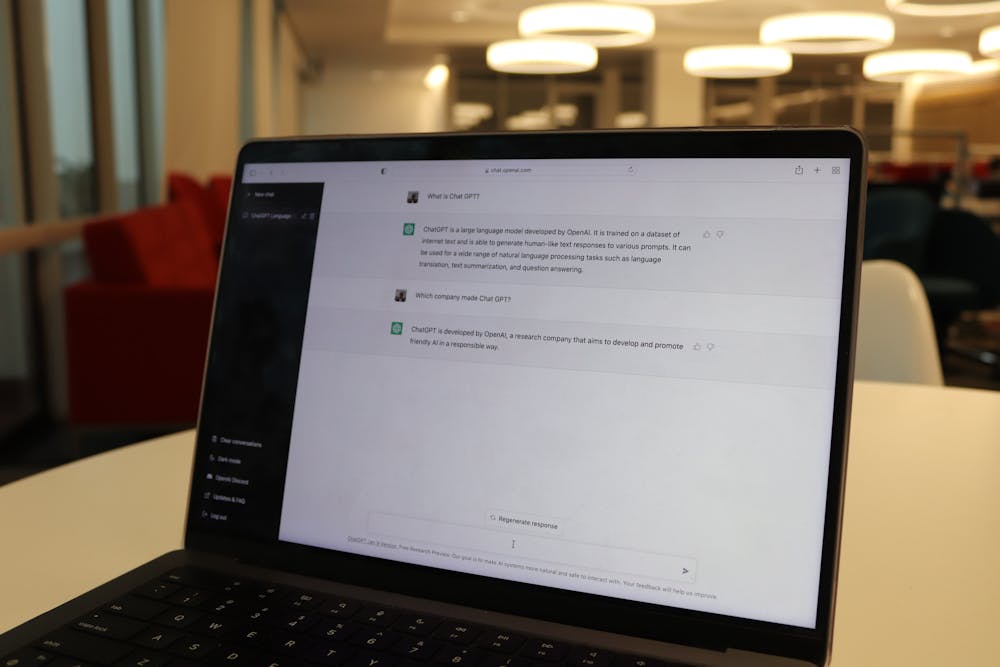
I support the use of ChatGPT.
A statement that, said aloud, would garner me sidelong stares despite the website’s appearance in many lecture halls.
The use of ChatGPT has raised much debate among students and become a topic of considerable contention. Similarly, many professors hold polarizing views, as the use of generative AI has been harshly rejected in some classrooms while others have tentative policies supporting its usage. The limitation of emerging technology in educational spaces should raise alarm bells, as we are rejecting tools that could be invaluable for facilitating learning.
To be clear, I am against academic dishonesty, and I haven’t used ChatGPT in a duplicitous manner. However, saying that ChatGPT is synonymous with academic misconduct is a remarkably weighty statement. I do assent that some individuals could use ChatGPT in an academically dishonest way, such as employing it to write papers in their stead. But, a similar result could be accomplished via other online tools, like Google. Just recently, we have become privy to accusations of plagiarism by former Harvard President Claudine Gay, revealing how this is not solely a ChatGPT issue. Thus, our viewpoint of the perpetrator should be reframed, delegating the fault to the person, not the tool.
With the release of GPT-4, many professors and students alike need to reconsider its benefits. Professors already recommend YouTube for content help, so why not ChatGPT?
ChatGPT can be a remarkable asset that provides an advantage to disadvantaged students. Since many Penn students come into university with a deep background in their chosen field of study, which they gained from their access to prep schools or private tutors, the bridge between these two groups is substantial. ChatGPT provides a way to somewhat balance the playing field.
For one, GPT-4’s added feature of uploading PDFs makes it ridiculously simple to ask questions about lecture content, at any time of the day, while tailoring it to your level of understanding, a skill that many professors and teaching assistants lack. As several professors are utterly immersed in their fields and many TAs have an intuitive grasp of the subject, they are often incapable of making complex topics digestible. Unfortunately, there have been many instances where I gave up on asking questions to avoid receiving a convoluted response.
With ChatGPT, feedback is immediate, allowing students to reflect on areas of improvement in their work, and providing them with mechanisms to improve over time. Why go through the hassle of setting up TA office hours to ask a simple question when ChatGPT can do it instantaneously?
Students outside of Penn who do not have access to an educational institution with tutoring facilities also stand to attain so much from receiving academic help from ChatGPT. This is due to its similarity to using online services like Khan Academy, though ChatGPT is much more personalized.
Professors who reject the idea of incorporating ChatGPT into classrooms have not considered thinking critically of its beneficial uses. Instead, they are content with adhering to traditional practices, foregoing innovation for comfort. On the other hand, students who are against the usage of AI hold themselves to a higher standard for not relying on outside sources — similar to many Penn students' views of receiving academic help through services like Weingarten tutoring or office hours. For many, receiving outside help is equated to a lack of intelligence. As with the many Penn students of privileged backgrounds, they do not require additional help and thus look down on disadvantaged students who do require these services.
In the end, humans are meant to be adaptable and always have been. Rejecting technological advancements accomplishes nothing; rather, it is actively harmful to many students who lose out on such a beneficial tool.
With that said, we should all sit to reflect on the valuable uses of ChatGPT.
KAYNATH CHOWDHURY is a College sophomore studying political science and computer science from Detroit, Mich. Her email address is kaynathc@sas.upenn.edu.
The Daily Pennsylvanian is an independent, student-run newspaper. Please consider making a donation to support the coverage that shapes the University. Your generosity ensures a future of strong journalism at Penn.
Donate







